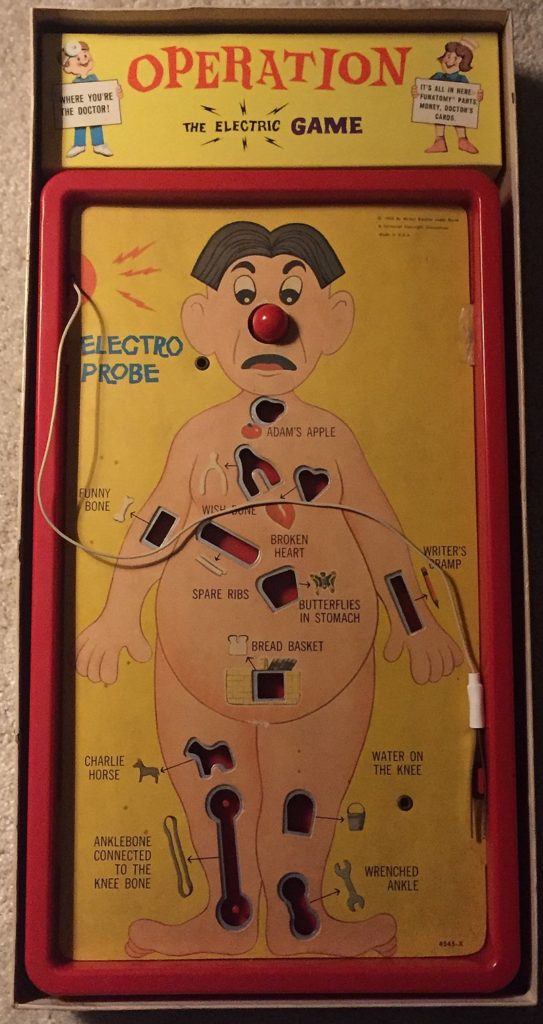Games, we all love games. What was the first game that you’ve ever played?
The first game I played was Operation, at least that’s the first game that comes to mind. Pulling plastic parts from a naked dude’s image wired to make a light and buzzer go off was weird. It was fun. It did indeed make me think about being a doctor–it made me think of things that didn’t occur to me.

That’s the short ah-ha moment I want to share with you today. Last week when I was driving I was listening to a Hidden Brain podcast, one specifically about how the Rand Corporation did war-gaming for the Pentagon.
Yes, the Pentagon hires people to play elaborate games to simulate all sorts of things. What would we do if had to get nukes out of a failed North Korea? If Russia invaded Estonia, how would that end up? These are both scenarios that the US government has gamed out.
Why? The answer lies in the title of the post. You can’t make a list of things that don’t occur to you. At least not easily, or without doing some work. The thought struck a cord with me and I’ve been thinking about this all last week when I was on vacation. We have unlimited imaginations–but we have limits on things, we have assumptions, we are experts in this or that, and sometimes that knowledge that we do have keeps us from the solutions that we might really need. How do we get rid of those limits?
We can play games; we can simulate situations–we can pretend. We can use games to put ourselves in situations, mentally, that we haven’t been in–and then magically, things can start to appear in our minds that could happen, and sometimes these things are beyond our current knowledge. The soldiers at the Pentagon love these games. They love the fact that they provide them with things that are unexpected. War apparently isn’t linear, and the systems we create to fight wars always have problems, unseen problems. Remember what one past US Secretary of State said:
“As we know, there are known knowns; there are things we know we know. We also know there are known unknowns; that is to say we know there are some things we do not know. But there are also unknown unknowns—the ones we don’t know we don’t know.”
Donald Rumsfeld, George W. Bush’s Secretary of State
This idea seems obvious, but, then I started to look back at some of the things I wanted or still want. A personal submarine was something that I want, did you know you can buy a small custom built submarine that’s like an underwater yacht? I didn’t, until a friend of mine in college told me about them. The point here is that we can’t want something that we don’t know about either. The sub was one of my unknown unknowns.

I have a lot of unknown unknowns! Dang it!
The other thought I had was problem solving. Haven’t you ever been challenged or tasked to do something and you just couldn’t figure out a way to do it? Then while you were struggling, someone comes up and shows you how to do the thing you’re trying to do with a technique that didn’t occur to you. Doesn’t it blow your mind when that happens? You say, “why didn’t I think of that?” Of course you didn’t think about it.
What about personal issues within your relationships? Do you find yourself having problems with how you’re dealing with others? Issues with your spouse? Could it be that you’re trying to solve those problems in ways that other people have figured out–but the easiest, best, technique or solution is just beyond your grasp–because it hasn’t occurred to you!!! Yikes! Even worse, because you’re not asking if you’re doing it wrong.
You might be doing it wrong
I think the biggest takeaway here is that we have to always be mindful and aware that there could be better ways we are solving the problems in our lives. We have to ask questions, we have to simulate situations, we have to create models that can help us sort through tough situations. Sometimes we have to get some training, and sometimes we have to play games to figure things out.
Have a tough meeting coming up? Create a mental simulation of that activity. Athletes do it all the time. I don’t think there is a single professional athlete out there that doesn’t use visualization to perform their sports, before they are out on the field, the court, the pitch. Gymnasts do this, race car drivers, pole vaulters…
Astronauts do it too. Get a tour of your local NASA center, you’re going to find simulators and simulations everywhere. Pilots, fly in simulators before they fly real planes. These simulators look like giant video games, and that’s really all they are. Did you know that the US Army was developing a video game to help find recruits that had great hand-eye coordination right after 9/11.
Practice within when you’re without
We can learn to never miss in our minds. We can find our unknown unknowns. That’s the thought I’ll leave you with today.
Have a great day! I love you! You are the best.
Featured Photo by Folu Eludire on Unsplash